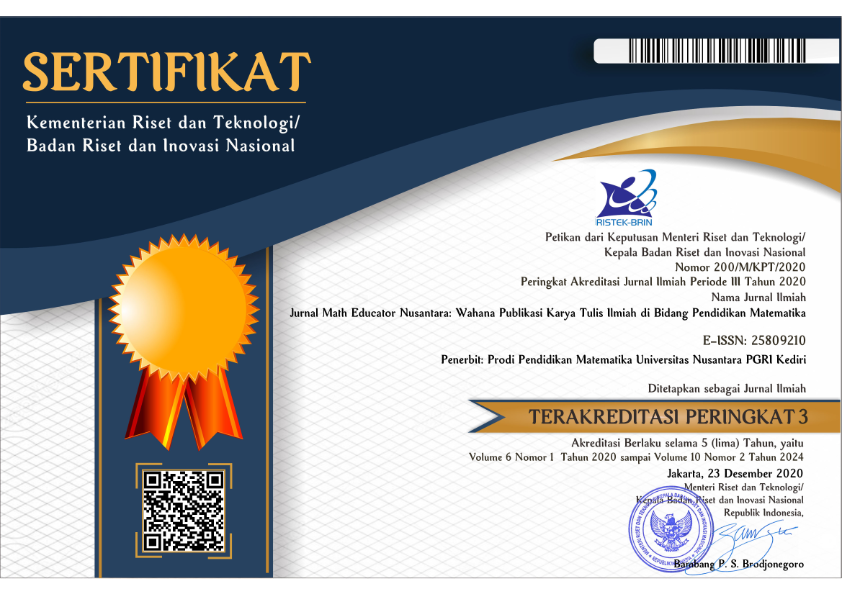Profile of Mathematics Problem Solving of MA Salafiyah Menganti Students Based on Personality Type
DOI:
https://doi.org/10.29407/jmen.v10i2.22310Keywords:
kepribadian ekstrovert, introverted personality, extroverted personalityAbstract
The purpose of this study was to describe the math problem solving profile of MA Salafiyah Menganti students in terms of introverted personality type and extroverted personality type. This research method uses descriptive qualitative. The results showed (1) introverted students in identifying known data, asked by being silent first, writing symbols according to what they understand, when making a mathematical model the subject pays attention to the problem given, writing the method used using elimination followed by substituting, the subject is seen solving the problem in detail and structured, solving the problem looks focused and working sequentially according to the steps, (2) extroverted students in identifying known and questionable data, by notwriting sentences, but only circling the problem and reading aloud, the subject spontaneously wrote symbols in the form of variables, the subject made a mathematical model by writing the equation, the subject revealed thestrategy by substitution, in applying the strategy.
References
Amaliatunnisa, N., & Hidayati, N. (2023). Analisis Kemampuan Pemecahan Masalah Matematis Siswa SMP Pada Materi Pola Bilangan. Jurnal Pembelajaran Matematika Inovatif, 6(1), 159–168. https://doi.org/10.22460/jpmi.v6i1.14515
Ar, N., & Syahrizal, S. (2017). Teori Belajar Al-Māwardi: Studi Analisis Tujuan dan Indikator Keberhasilan Belajar. Ulumuna, 18(1), 41–58. https://doi.org/10.20414/ujis.v18i1.152
Arnawa, I. M., Sumarno, U., Kartasasmita, B., & Baskoro, E. T. (2012). Applying The Apos Theory To Improve Students Ability To Prove In Elementary Abstract Algebra. Journal of the Indonesian Mathematical Society, 133–148. https://doi.org/10.22342/jims.13.1.80.133-148
Effendi, K. N. S. (2017). Pemahaman Konsep Siswa Kelas VII Pada Materi Kubus dan Balok. Symmetry: Pasundan Journal of Research in Mathematics Learning and Education, 2(2), 87–94. https://doi.org/10.23969/symmetry.v2i2.552
Fatmawati, I., & Khabibah, S. (2019). Profil Siswa SMP Dalam Memecahkan Masalah Matematika Ditinjau Dari Tipe Kepribadian. 8(2).
Ghofur, A., Jatmiko, B., & Sanjaya, I. G. M. (2023). Profile of High School Students’ Problem-Solving Skills and the Application of Problem-Based Learning: A Preliminary Study. Studies in Learning and Teaching, 4(3), 522–536. https://doi.org/10.46627/silet.v4i3.317
Halima, N. (2020). Profil Kemampuan Komunikasi Matematis Siswa Dalam Menyelesaikan Soal Sistem Persamaan Linear Tiga Variabel (SPLTV) Ditinjau Dari Kepribadian Extrovert dan Introvert. Jurnal Program Studi Pendidikan Matematika, 11(3), 1–10. https://doi.org/10.19184/kdma.v11i3.20158
Jazuli, A., & Lathifah, M. (2018). Deskripsi Kemampuan Pemecahan Masalah Matematis pada Soal Cerita Berdasarkan Tipe Kepribadian Ekstrovert-Introvert Siswa SMP Negeri 6 Rembang. AlphaMath : Journal of Mathematics Education, 4(1), 23. https://doi.org/10.30595/alphamath.v4i1.7352
Juliansa, M. F., Kartinah, K., & Purwosetiyono, Fx. D. (2019). Kemampuan Pemecahan Masalah Matematika Siswa Kelas X Dalam Mengerjakan Soal Cerita Pada Siswa Tipe Kepribadian Ekstrovert dan Introvert. Imajiner: Jurnal Matematika dan Pendidikan Matematika, 1(5), 133–137. https://doi.org/10.26877/imajiner.v1i5.4459
Kristanto, H. Y. W. (2019). Profil Pemecahan Masalah Sistem Persamaan Linear Tiga Variabel Siswa SMA Ditinjau Dari Perbedaan Jenis Kelamin. : : Jurnal Program Studi Pendidikan Matematika, 5(2), 115–123. https://scholar.google.com/scholar?hl=en&as_sdt=0%2C5&q=PROFIL+PEMECAHAN+MASALAH+SISTEM+PERSAMAAN++LINEAR+TIGA+VARIABEL+SISWA+SMA+DITINJAU+DARI++PERBEDAAN+JENIS+KELAMIN&btnG=
Layali, N. K. (2020). Kemampuan Pemecahan Masalah Matematis Melalui Model Treffinger di SMA. Jurnal Pendidikan Matematika Raflesia, 05(02), 137–144. https://doi.org/10.33369/jpmr.v5i2.11448
Lee, P.-J., & Wu, T.-Y. (2022). Mining relations between personality traits and learning styles. Information Processing & Management, 59(5), 103045. https://doi.org/10.1016/j.ipm.2022.103045
Napitupulu, O. T., Simamora, R., & Sinaga, C. V. R. (2023). Pengaruh Pendekatan Matematika Realistik (PMR) Terhadap Kemampuan Pemecahan Masalah dalam Penyelesaian Soal Cerita Pada Kelas XI SMA Negeri 1 Pematang Siantar Tahun Ajaran 2023/2024. Journal Of Social Science Research, 3(6). https://doi.org/10.31004/innovative.v3i6.7222
Ni’mah, N. (2022). Analisis Indikator Berpikir Kritis Terhadap Karakter Rasa Ingin Tahu Dalam Kurikulum 2013. Anterior Jurnal, 22(1), 118–125. https://doi.org/10.33084/anterior.v22iSpecial-1.3220
Pairunan, F. S., Sudarman, & Jaeng, M. (2020). Profil Pemecahan Masalah Siswa Pada Belah Ketupat Dan Layang-layang Ditinjau Dari Tipe Kepribadian Di Kelas VII SMP Negeri 20 Palu. Jurnal Elektronik Pendidikan Matematika Tadulako, 8(2), 139–153.
Pramudjono. (2014). Pengaruh Kepribadian dan Disiplin Siswa Terhadap Hasil Belajar Matematika Siswa Kelas VII SMP Negeri Se-Kecamatan Samarinda Ilir Tahun Pembelajaran 2012/2013. Jurnal Ilmu Pendidikan LPMP Kalimantan Timur, 8(1), 1–23. https://repositori.kemdikbud.go.id/15474/
Putri, R. S., Suryani, M., & Jufri, L. H. (2019). Pengaruh Penerapan Model Problem Based Learning Terhadap Kemampuan Pemecahan Masalah Matematika Siswa. Mosharafa: Jurnal Pendidikan Matematika, 8(2), 331–340. https://doi.org/10.31980/mosharafa.v8i2.471
Putri, W. A., & Masriyah, M. (2020). Profil Kemampuan Pemecahan Masalah Matematika Siswa SMP Pada Materi Segiempat Ditinjau Dari Tipe Kepribadian Ekstrovert-Introvert. MATHEdunesa, 9(2), 392–401. https://doi.org/10.26740/mathedunesa.v9n2.p392-401
Qomariyah, N. (2016). Profil Pemahaman Siswa SMA Dalam Memecahkan Masalah Persamaan Kuadrat Ditinjau Dari Perbedaan Kepribadian Extrovert Dan Introvert. APOTEMA : Jurnal Program Studi Pendidikan Matematika, 2(1), 87–95. https://doi.org/10.31597/ja.v2i1.135
Rahim, R. (2018). Peningkatan Kemampuan Komunikasi dan Kemandirian Belajar Matematis Siswa SMK Negeri 5 Medan dengan Menggunakan Pembelajaran Berbasis Masalah. Jurnal MathEducation Nusantara, 1(2), 68–81. https://doi.org/10.54314/jmn.v1i2.40
Riasari, D. (2018). Peranan Model Pembelajaran Matematika Berbasis Blended Learning Terhadap Komunikasi Matematis Siswa Dalam Materi Statistik Pada SMAN 1 TAPUNG. Jurnal Pendidikan Tambusai, 2(4), 813–820. https://doi.org/10.31004/jptam.v2i4.28
Riawan, I., Sujiran, & Puspananda, D. R. (2020). Analisis Kemampuan Pemecahan Masalah Matematika Pada Materi Aritmatika Sosial Ditinjau Dari Tipe Kepribadian Siswa. Educatif Journal of Education Research, 2(3), 13–24. https://doi.org/10.36654/educatif.v2i3.20
Sari, A. A., & Kurniasari, I. (2022). Perbedaan Kemampuan Pemecahan Masalah Matematika Siswa Pada Materi SPLTV Ditinjau Dari Tipe Kepribadian Ekstrovert Dan Introvert. MATHEdunesa, 11(3), 938–947. https://doi.org/10.26740/mathedunesa.v11n3.p938-947
Satriawan, H., Budiyono, & Indriati, D. (2019). The Mathematical Communication Process of Extrovert introverted Students in Solving the Contextual Mathematics Problem. Proceedings of the 2nd International Conference on Education,(ICE), 492–499. https://doi.org/10.4108/eai.28-9-2019.2291054
Sumadi, S. (2011). Psikologi Kepribadian. Raja Grafindo Persada.
Supriadi, N., Jamaluddin Z, W., & Suherman, S. (2024). The role of learning anxiety and mathematical reasoning as predictor of promoting learning motivation: The mediating role of mathematical problem solving. Thinking Skills and Creativity, 52, 101497. https://doi.org/10.1016/j.tsc.2024.101497
Tong, C. K.-Y., Yip, E. S.-K., & Wong, T. T.-Y. (2023). Examining the unique contributions and developmental stability of individual forms of relational reasoning to mathematical problem solving. Contemporary Educational Psychology, 73, 102181. https://doi.org/10.1016/j.cedpsych.2023.102181
Widayanti, L. (2016). Deskripsi Level Kemampuan Siswa SMP Dengan Tipe Kepribadian Cenderung Introvert Dalam Menyelesaikan Masalah Matematika. Jurnal Edukasi, 2(1), 83–94. https://lppm.stkippgri-sidoarjo.ac.id/files/DESKRIPSI-LEVEL-KEMAMPUAN-SISWA-SMP-DENGAN-TIPE-KEPRIBADIAN-CENDERUNG-INTROVERT-DALAM-MENYELESAIKAN-MASALAH-MATEMATIKA.pdf
Yuhani, A., Zanthy, L. S., & Hendriana, H. (2018). Pengaruh Pembelajaran Berbasis Masalah Terhadap Kemampuan Pemecahan Masalah Matematis Siswa SMP. Jurnal Pembelajaran Matematika Inovatif, 1(3), 445–452. https://doi.org/10.22460/jpmi.v1i3.p445-452
Zuniana, E. R., & Rahaju, E. B. (2019). PEMECAHAN MASALAH ALJABAR SISWA SMP DITINJAU DARI TIPE KEPRIBADIAN. Jurnal Ilmiah Pendidikan Matematika, 8(2).
Downloads
Published
Issue
Section
License
Authors who publish with this journal agree to the following terms:
- Copyright on any article is retained by the author(s).
- The author grants the journal, the right of first publication with the work simultaneously licensed under a Creative Commons Attribution License that allows others to share the work with an acknowledgment of the work’s authorship and initial publication in this journal.
- Authors are able to enter into separate, additional contractual arrangements for the non-exclusive distribution of the journal’s published version of the work (e.g., post it to an institutional repository or publish it in a book), with an acknowledgment of its initial publication in this journal.
- Authors are permitted and encouraged to post their work online (e.g., in institutional repositories or on their website) prior to and during the submission process, as it can lead to productive exchanges, as well as earlier and greater citation of published work.
- The article and any associated published material is distributed under the Creative Commons Attribution-ShareAlike 4.0 International License













